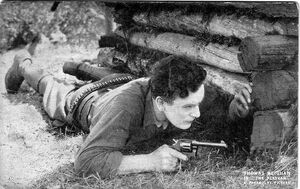
Thomas "Tommy" Meighan
Thomas Meighan (1879–1936) American Actor. Sadly, this once-popular silent screen star and older matinée idol for Paramount Studios, is all but forgotten today. Thomas "Tommy" Meighan was one of the rulers of the Hollywood roost, between the years 1915 and 1928. He was born in Pittsburgh, his father a president of a major manufacturing company. Meighan switched interests from medicine to acting during his mid-college years, joining Henrietta Crosman's Pittsburgh stock company as his initiation to professional theater. During these years he met and married stage actress Frances Ring, who was the sister of actors Blanche and Cyril Ring, enjoying a long and happy wedded life. Having developed a highly respected name for himself on Broadway right after the turn of the century, he decided, at the age of 36, to give up the stage in order to pursue the still-floundering medium of movie-making. It was a wise and prosperous move. Meighan made his debut opposite Laura Hope Crews in The Fighting Hope (1915) and became a Paramount favorite of producer/director Cecil B. DeMille's with leading man roles in Kindling (1915), The Trail of the Lonesome Pine (1916), Male and Female (1919), Why Change Your Wife? (1921) and Manslaughter (1922). Meighan lit up the silver screen time and time again paired up with Hollywood's top echelon of silent femmes including Lila Lee, Blanche Sweet, Lois Wilson, Pauline Frederick, Billie Burke, Norma Talmadge, Charlotte Walker, and Leatrice Joy. He would make his film masterpiece with The Miracle Man (1919), also starring Lon Chaney, in which he played Tom Burke, a notorious con-man, who tries one last scheme, a faith-healing scam, before going clean. Unfortunately, this 8-reel silent classic is now lost but for a minor portion. Meighan would earn between $5,000 to $10,000 a week during his prime years. Although his first talking picture, The Argyle Case (1929), was a success, Meighan's career went into a rapid decline come the advent of sound, playing a few fatherly types in support at the very end. His last film was Peck's Bad Boy (1934) starring young Jackie Cooper. At about this time the actor discovered he had cancer and was forced to withdraw from the screen. He died two years later on July 8, 1936. He and wife Frances had no children.
Trivia[]
Brother-in-law of Blanche Ring and Cyril Ring.
Uncle of director A. Edward Sutherland.
Uncle of radio actor James Meighan (died 1970) who played the Falcon in radio from 1945 - 1947.
Was a friend of writer Ring Lardner who went on to mention him in his short story "Haircut."
Meighan was the only attendee and witness at the secret marriage of Olive Thomas and Jack Pickford on October 25, 1916.
The leopard around Meighan's neck in "Male and Female" belonged to the Selig Zoo and was due to be destroyed because it had mauled someone. Director Cecil DeMille bought it and kept it sedated with chloroform during its scenes with the actor. Reportedly lip-readers could see the frightened Meighan begging the director to get the scene in the can, so he could get the deadly cat off his shoulders.
Meighan did not mix socially with other actors. He played golf often with Ring Lardner and Booth Tarkingtonwas and was reportedly very friendly with Irish tenor John McCormack, Gene Tunney, and President Calvin Coolidge.
In the mid-20s Paramount decided to close its New York Astoria studio and bring its big three stars, Richard Dix, Bebe Daniels, and Thomas Meighan to Hollywood. Meighan refused and was too big a star at the time to be fired, so the studio ostensibly kept the facility open for him.